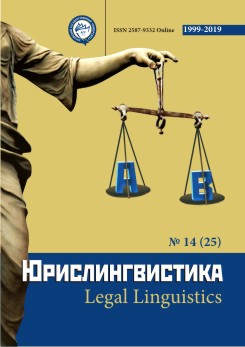Framing and Differentiation of Presumptions and Fictions in Labor Law
Abstract
The article discusses presumptions and fictions in labor law as means of legal technique, as well as issues of their framing and differentiation. It has been established that in the branch of law under consideration(as well as in its other branches) the legislator uses words which reflect the nature and which are a common form of expression of legal fiction to entrench the presumption in the rule of law, which contributes to the confusion of these means of legal technique. Still the main criterion for distinguishing between presumptions and fictions is not the verbal form of their expression, but the presence or absence of a degree of probability. It has been found out that the possibility of entrenching the legal fiction with the help of both typical words and without them led to the point of view questioning the use of legal fictions in labor law as special means of legal technique. The author proves the inconsistency of this point of view by explaining this possibility by the existence of two ways of entrenching the legal fiction: direct and indirect, and it is established that fictions as means of legal technique in the considered branch of law are a very common phenomenon. It is concluded that for correct identification of the above legal phenomena in legal rules and differentiation between them, one should remember that the presence or absence of presumption or fiction in a specific rule of law as means of legal technique is not determined by the presence or absence of typical words, but rather by the meaning and legal value of this rule of law which it has according to the discretion of the legislator.
Downloads
Metrics
References
Головина С.Ю. Презумпции в трудовом праве / Юридическая техника. - 2010. - № 4. - С. 114-118.
Лушникова М.В., Лушников А.М. Очерки теории трудового права. СПб., 2006.
Смирнов Д.А. Проблема фикций в трудовом праве: реальная или надуманная? / Вестник ЯрГУ. Серия Гуманитарные науки. - 2017. - № 2 (40). - С. 51-55.
Танимов О.В. Теория юридических фикций: монография / отв. ред. д.ю.н., проф. Т.В. Кашанина. М., 2016.
Чуфаров В.Ю. Нетипичные нормативные предписания в трудовом праве: дис…. канд. юрид. наук: 12.00.05. Екатеринбург, 2010.
References
Golovina, S.Yu. (2010). Presumptions in labor law. [Prezumptsii v trudovom prave]. Legal technique, 4, 114-118 (in Russian).
Lushnikova, M.V., Lushnikov, A.M. (2006). Essays on the theory of labor law. [Ocherki teorii trudovogo prava]. St. Peterburg (in Russian).
Smirnov, D.A. (2017). The fiction problem in labor law: real or far-fetched? [Problema fiktsiy v trudovom prave: real'naya ili nadumannaya?]. Vestnik of Yaroslavl State University. Series Humanities, 2 (40), 51-55 (in Russian).
Tanimov, O.V. (2016). Theory of legal fictions: monograph / ed. [Teoriya yuridicheskikh fiktsiy]: a monograph / ex. ed. Doctor of Law, prof T.V. Kashanina. Moscow (in Russian).
Chufarov, V.Yu. (2010). [Netipichnyye normativnyye predpisaniya v trudovom prave]: Atypical normative precepts in labor law: dis .... cand. legal sciences: 12.00.05. Ekaterinburg (in Russian).
Copyright (c) 2019 Олеся Евгеньевна Зацепина

This work is licensed under a Creative Commons Attribution 4.0 International License.
The authors, which are published in this journal, agree to the following conditions:
1. Authors retain the copyright to the work and transfer to the journal the right of the first publication along with the work, at the same time licensing it under the terms of the Creative Commons Attribution License, which allows others to distribute this work with the obligatory indication of the authorship of this work and a link to the original publication in this journal .
2. The authors retain the right to enter into separate, additional contractual agreements for the non-exclusive distribution of the version of the work published by this journal (for example, to place it in the university depository or to publish it in a book), with reference to the original publication in this journal.
3. Authors are allowed to post their work on the Internet (for example, in a university repository or on their personal website) before and during the review process of this journal, as this may lead to a productive discussion, as well as more links to this published work (See The Effect of Open Access).











